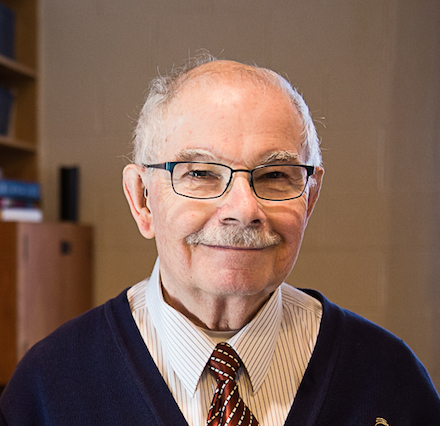December 17, 2020
This year, in celebration of the College’s eightieth anniversary, we have been posting monthly articles on the history of the College. The full list is provided at the end of this page. In bringing the series to a close, there was no better way to honour and reflect on the College’s eight decades of ministry than to speak with “Mr. Emmanuel” himself, President Emeritus Dr. Thomas E. Dow.
Dr. Dow was a student of the College in the days when it operated in the Ahrens Street mansion in Kitchener, and he went on to be a faculty member as well as a pastor and missionary. He served as Emmanuel president from 1988 to 2002 and interim president from 2009 to 2012. Dr. Dow continued to teach at Emmanuel until 2013 and is known by a great many alumni across the world as a lively instructor with an astonishing depth of knowledge and a love for classroom discussion.
As he looks back on his many years of service with Emmanuel, one theme that stands out to Dr. Dow is his unwavering belief in the Bible-college model. This was not a belief that others in the church always shared. On the one hand, some felt that accreditation was unnecessary; a ministry school should simply focus on forming strong, evangelistic believers and forget about satisfying academia. On the other hand, there were some within the world of Christian higher education who wanted theological colleges to grow into broader and more mainstream—though certainly still Christian—institutions. Without disparaging these other approaches, Dr. Dow and Emmanuel were committed to a middle way that included accreditation and strong academics but was enthusiastically a place of preparation for Christian service.
The journey to accreditation was a long one. It formally began in the 1970s under the leadership of President Dr. Charles Seidenspinner and was completed during the incumbency of his successor, Ellis Lageer. The fulfilling of this goal required a huge amount of work and was a significant step for a small school that held its first classes in the basement of a church. For Dr. Dow, it was well worth the work; he considers it to be the primary highlight of all his years at Emmanuel.
Amidst the many shifts and developments happening within evangelicalism and across the landscape of higher education, Dr. Dow is still a believer in the Bible-college middle way that he championed years ago. He also thinks that if the school’s early leaders could speak today, they would encourage Emmanuel to remain committed to the strong biblical education that has characterized it for these eight decades.
Dr. Dow believes that there is another lesson to be found in the early years of Emmanuel’s history. The school avoided the pitfall of becoming “coldly academic” and instead fostered a strong sense of community to the point that people felt like part of a family. This, he affirms, is an important aspect of the school that needs to be maintained and renewed as time goes on.
Finally, he has fond memories of building connections beyond the borders of the College campus. He enjoyed visiting many other Christian theological institutions in Canada and was especially excited about the school’s relations with Korean and Russian believers. Former academic dean Jim McDowell also has many memories relating to these relationships, and a number of them were recorded in an earlier article.
This year, as the eightieth anniversary has been discussed frequently on campus, the leadership of the College has reaffirmed its identity and the priorities Dr. Dow emphasizes. It remains committed to being an accredited evangelical Bible college that equips believers for effective service in the church and the world. A number of changes and innovations have been required this year, and more may follow, but they, far from signifying a change in this foundational commitment, are a means of acting out the commitment effectively. Further, although the COVID-19 pandemic has presented a number of challenges and obstacles, the school is working to continue fostering the sense of community that has always been central to the Emmanuel experience. With all this in mind, it seems fair to say that central figures from Emmanuel’s past, like Mother Maude Warder and President Bruce Wideman, would be proud of what the school is doing eight decades after that first group of students met to study the Bible in Stouffville, Ontario.
Previous historical articles:
Pre-1940’s: “Revival on the Emmanuel Grounds”
1940’s: “Mother Warder, a ‘Great Prayer Warrior’ and Spiritual Guide of Emmanuel’s Early Years”
1950’s: “Korean Student Paints Pictures in Kitchener Sanatorium”
1960’s: “‘Builder’ President Helps Constructs Solid Future for Emmanuel”
1970’s: “1970’s Students Earn Glowing Reputation for Emmanuel”
1980’s: “From Tabernacle to Land of Learning: The Story of the Pridham Library”
1990’s: “Faculty Teach in Siberia after Fall of Soviet Union”
2000’s: “Emmanuel Welcomes New Millennium with Diamond-Jubilee Celebration”
2010’s: “Teen Challenge Grads Enrich Emmanuel Community”
Other: “Music Groups Glorify God through Recordings”; “Sports Traditions Bring Students Together”

